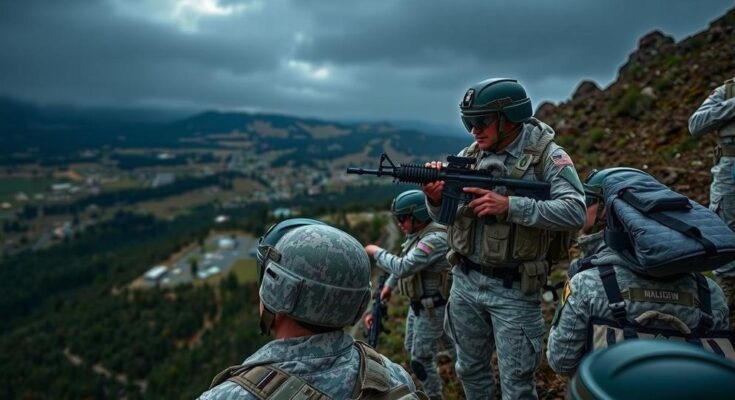The Russian military has intensified its presence in Southern Syria to prevent conflicts stemming from Israeli activities in the Golan Heights. Israel is constructing a separation wall, which has raised international legal concerns. Israeli airstrikes have increased, prompting Russia to enhance its military operations with Syria, fostering their joint response to regional threats.
Recent reports indicate that the Russian military has bolstered its presence in nine observation posts throughout southern Syria, particularly in the Daraa and Quneitra governorates adjacent to the Israeli-occupied Golan Heights. This initiative is purportedly aimed at averting potential escalations that may arise from Israeli activities in the region. Alongside these developments, Israel has been engaged in constructing a separation barrier along the disengagement zone, prompting criticism and accusations of violating longstanding ceasefire agreements established with Syria.
The United Nations has expressed concern regarding Israel’s breach of a 50-year ceasefire accord following the commencement of construction activities on this wall, which has been confirmed through satellite imagery depicting significant excavation and infrastructure work extending for approximately 7.5 kilometers. Moreover, Israeli armored vehicles have been deployed to secure the construction area, indicating a heightened military presence.
Avigdor Lieberman, a member of the Knesset and former defense minister, has issued warnings regarding the use of Syrian territory by hostile entities, suggesting that further escalations might result in Israel asserting control over the Syrian portion of Mount Hermon. Concurrently, Russian and Syrian military forces have intensified their collaborative operations, primarily targeting groups supported by Western nations. Reports from Al Akhbar highlight Russian efforts to ensure security through both aerial and ground monitoring with intentions to facilitate the safe return of displaced residents of the region.
The increasing Israeli assertions within the Golan Heights, including the extension of citizenship rights and the development of settlements, have drawn severe criticism as violations of international law. Furthermore, Israeli airstrikes have surged since the onset of intensified military operations in Lebanon, with daily attacks targeting major Syrian cities. Some strikes reportedly occurred in proximity to the Russian Hmeimim airbase, compelling Moscow to initiate the activation of its air defense mechanisms.
The geopolitical landscape surrounding the Israeli-occupied Golan Heights remains complex, with tensions stemming from historical conflicts involving Israel, Syria, and Russian involvement. The recent increase in Russian military presence is indicative of a strategic alignment with the Syrian government, particularly in response to increasing Israeli military activities that threaten regional stability. The construction of a separation wall reflects Israel’s long-standing efforts to assert its control over disputed territories, while international laws surrounding such actions remain a point of contention.
In summary, the escalation of military activities by both Israel and Russia in the Golan Heights underscores a volatile situation where national interests intersect with regional security concerns. The construction of a separation wall by Israel raises legal questions concerning international law, while Russia’s increased military presence suggests a focused endeavor to support the Syrian government against perceived threats. The dynamics in this region warrant close examination as they could significantly influence future geopolitical relations.
Original Source: thecradle.co




